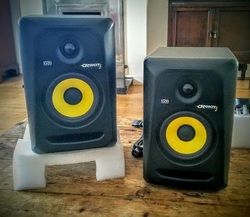New Studio Monitors So yesterday my studio monitors decided to give up the ghost (to be fair they've gone full pelt for around four and a half years). Being on deadlines for Scream Street, it wasn't an option to wait for new ones. I needed to fix or replace them quickly, as working with headphones for extended periods isn't a particularly good idea. After a consultation with technical guru Rhod I'd ordered these little guys from Andertons in Guildford who offer next day delivery. So, thanks to Rhod for the tip, and thanks to Andertons for their great service. Creativity: it's not about the 9 to 5 I've started writing this at 10am in a local coffee shop. On a week day. Ooh, you might think, isn't he lucky to be swanning around drinking coffee while the rest of us are working? The reality is very, very different. I've worked in a few different industries in my adult working life, some office-based, one classroom-based, all - apart from the current one as a media composer - have been dictated by the hours given to me. Nowadays I'm driven by a different parameter: How can I be the most creative I can be? Here are a few (not all) of the things I've learned along the four+ years I've been composing music professionally. 1. It's not about the 9 to 5. This was a difficult one for me after so many years of routine. Getting up at a certain time and being in a certain place used to = productivity. It took me a while to realise that sitting at the computer and waiting for the ideas to form wasn't the best way to use my time. If I was given a deadline two weeks away there had to be a better way than that. I quickly realised that time away is a brilliant way of generating ideas. Next time you're stuck, just go for a walk. I promise you by the time you get back to your desk you'll have the beginning of something. 2. Think about the tools you need, not about the tools you have. Once I found my new way of working, I naturally started veering towards routine again, this time in the tools I was using. Now, for something like a TV series it's important for me to use the same instruments and musical motifs for each episode and character, but it shouldn't necessarily be the case for everything I do. So I've started to approach anything new with the attitude that I don't have any tools. How can I realise this? What do I need to get it done? A much better starting point. 3. Personalise your space. Another factor that didn't hit me until it happened (why would it?) is to consider my environment. Since turning pro I've worked from home, and for a few years this meant in a rented property where I couldn't hang anything on the walls, I couldn't decorate etc, so while I had a space for work it wasn't a particularly inspiring space. Now I have album art and other personal things surrounding me. It makes a difference. 4. Work at your craft. Finally, and possibly the most important, is to work at your craft. For me that one piece of advice at the start of 'keep composing, even if you don't have a deadline', may be the best single piece of advice I've received regarding creativity. You can network 'til you're blue in the face, but if you don't retain the passion for what you do by losing yourself in it and trying to get better at it, what's the point? So, as I sit here sipping my coffee, I know that I'll get the job done, by going back to the studio refreshed and feeling creative. Who knows, maybe I'll knock off early. |
Details
AuthorPosts by Gareth Davies. Archives
November 2020
Categories
All
|
© 2024 The Sound Boutique Limited. All rights reserved.
Registered address: 11/12 Hallmark Trading Centre, Fourth Way, Wembley, Middlesex, United Kingdom, HA9 0LB.
Registered address: 11/12 Hallmark Trading Centre, Fourth Way, Wembley, Middlesex, United Kingdom, HA9 0LB.

 RSS Feed
RSS Feed